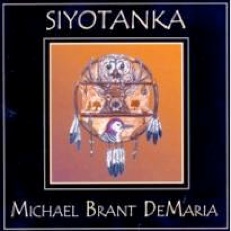Siyotanka (pronounced see-yoh-tahn-kah) is a soul-stirring and fascinating musical journey by Michael Brant DeMaria. The music is the award-winning soundtrack to an original play by DeMaria and Stephen C. Lott titled “
Siyotanka: The Legend of the Flute.” The play is based on the Lakota legend, which tells of the quest to find one’s soul song and the journey each of us must take to become our true selves, risking ridicule, fear, and danger. Demaria composed and performed all of the music on piano, synthesizer, and Native American flutes. Also a practicing clinical psychotherapist, an adjunct professor at three institutions, and the author of several books and papers, Dr. DeMaria has performed onstage with artists such as R. Carlos Nakai, Mary Youngblood, and David Darling. He has played keyboards and percussion since childhood, but he first heard the haunting sounds of the Native American flute while enacting a traditional vision quest in the wilds of Canada fifteen years ago - an encounter that changed his life. The music of
Siyotanka ranges from flute with light percussion and/or nature sounds in the background to a big cinematic sweep with pulsating drums, the call of eagles, and light orchestration. Some of the pieces are quite ambient where others are somewhat more melodic. I don’t pretend to be a scholar of Native American music, but this album has deeply affected me with its energy and sincerity. It is also very worth mentioning that 10% of the profits from this CD will go to Native American charities. DeMaria explains the tragic plight of the Lakota people on his website
(http://www.ontos.org/Store_music_Siyotanka.htm).
Siyotanka begins with “The Village,” a prelude of sorts that effectively sets the stage and mood with flute accompanied by a repeated keyboard rhythm, the sound of birds, and light orchestration. The flute has a mournful quality that is offset by a rhythm that suggests gentle rain or perhaps a carefree dance or even simple innocence. The title track is mostly flute and a deep-sounding drum that represents the heartbeat of the ancestors. The combination of flute and drum heightens the mystery and sounds more than a little bit ominous. “Grandfather” is mostly drums and chanting, representing the Elders blessing Takoda (the main character of the play) and sending him on his quest. “The Quest” is gorgeous. Darkly mysterious and spare, flute, piano, and drum are hypnotic. “The Dream” is also exceptional from both a musical and an emotional perspective. Expressing physical and psychological despair, the pain is palpable. Over the course of the 8-minute piece, Takoda receives a vision of the path before him and hope begins to return, evolving into strength and a clear sense of direction. From here, Takoda learns life lessons from teachers such as a woodpecker, an owl, and three trees. The music is bright and clear, and the sounds of nature give it optimism and grace as well as atmosphere. “Beyond the Known” is captivating with its intense guitar rhythm and subtle orchestration. If this piece doesn’t move you, something’s wrong! “Becoming Takoda” illustrates Takoda’s transformation as he realizes the beauty of life and its lessons, opening his heart and discovering his Soul Song. Cinematic yet intensely spiritual, DeMaria effectively portrays the world opening up to this young man along with the wonder of new wisdom and awareness. The “
Siyotanka Reprise” that concludes the album shows Takoda returning to his village with the first flute and the Soul Song that he plays with all of his heart.
This is my first CD review of 2009, and I strongly feel that
Siyotanka will still be on my list of favorites for the year next January.
Siyotanka is available from www.ontosmusic.com, cdbaby.com, amazon.com, and iTunes. I give it my highest recommendation!

